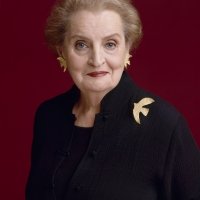The Inaugural Haleh Esfandiari Forum Event with Secretary Madeleine Albright
The Honorable Madeleine Albright, former U.S. Secretary of State, discussed women’s empowerment in the Middle East and North Africa (MENA) region.
On March 29, 2017 the Middle East Program, the Global Women’s Leadership Initiative, and the Women in Public Service Project at the Wilson Center hosted “The Inaugural Haleh Esfandiari Forum Event with Secretary Madeleine Albright.” The Honorable Jane Harman, Director, President, and CEO of the Wilson Center, moderated the discussion. Henri J. Barkey, Director of the Middle East Program at the Wilson Center, delivered introductory remarks. In his opening remarks, Barkey thanked Albright for being the first keynote speaker of the Haleh Esfandiari Forum and stated the purpose of the forum is to highlight women who have made a significant impact and to promote women’s empowerment in the MENA region.
Albright began her remarks by speaking about her experience as a former Wilson Center Fellow and the importance of the Wilson Center as a place that is unafraid to shed light on tough issues like women’s empowerment in the Middle East. Albright credited Haleh Esfandiari as an individual who has been a force for change in women’s empowerment and commended the Wilson Center for establishing the Haleh Esfandiari Forum to promote public discussion of women’s empowerment in the MENA region. She stressed the importance of increased political and economic participation by women, which have been overlooked as a marginal concern, when compared to the “hard” issues of big power politics and the military. Albright also mentioned the correlation between gender discrimination in the region and women having the lowest labor force participation rate and the lowest rate of political representation in the world.
Albright revealed that as co-chair of the Middle East Strategy Task Force at the Atlantic Council, she had devised a two-prong, durable U.S. strategy toward the Middle East that accurately reflects the ongoing issues in the region today. The first prong involves the use of military and diplomatic tools to wind down civil wars and achieve political settlements; the second prong, which Albright stressed was more important, provides long-term stability in the region by supporting “bottom-up” efforts of social activists and civic entrepreneurs while encouraging governments to invest in the education and empowerment of their people. Albright believes this would be the best way to address societal, economic, and governance issues and to unlock the significant human potential of women in the Middle East.
Albright then commented on the alarming number of women who have been targeted because they are involved in political activity or simply expressing their political views, an issue that is often overlooked. She continued by saying that women have played a significant role in organizing opposition to autocratic regimes, stressing that the way to protect women in the Middle East is to allow them to exercise their political rights.
Harman began the conversation by recounting her experience attending the “Fourth World Conference on Women” in Beijing with Albright in 1995. It was at the conference, Harman continued, that then-First Lady Hillary Rodham Clinton pronounced “human rights are women’s rights and women’s rights are human rights,” which became an unofficial the motto of the women’s rights movement. Harman also spoke of the “50x50” pins she and Albright donned to recognize the Women in Public Service Project (WPSP)’s “50x50 vision” of 50 percent representation of women in political and policy leadership worldwide by 2050. The WPSP was founded at the State Department in 2011 under then-Secretary Hillary Clinton, and moved to the Wilson Center when Harman assumed the position of Director, President, and CEO. Harman highlighted the WPSP’s work developing a comprehensive index of women in public service leadership globally.
In the Q&A session, Esfandiari commented how the United States has always been a place that has welcomed people who are looking for a better life and future. Esfandiari questioned what could be done so that people would continue experience the standards previous generations did and if the “doors” of the United States continued to stay open. Albright answered the question by mentioning her own personal experience coming to the United States as a refugee from Czechoslovakia and how it eventually led to her obtaining her citizenship.
By Oumama Kabli, Middle East Program
Introduction

Senior Fellow, Council on Foreign Relations
Keynote Speaker

U.S. Secretary of State (1997-2001)
Moderator

Hosted By

Middle East Program
The Wilson Center’s Middle East Program serves as a crucial resource for the policymaking community and beyond, providing analyses and research that helps inform US foreign policymaking, stimulates public debate, and expands knowledge about issues in the wider Middle East and North Africa (MENA) region. Read more


Global Women's Leadership Initiative
The Global Women’s Leadership Initiative has hosted the Women in Public Service Project at the Wilson Center since June, 2012. The Women in Public Service Project will accelerate global progress towards women’s equal participation in policy and political leadership to create more dynamic and inclusive institutions that leverage the full potential of the world’s population to change the way global solutions are forged. Read more
